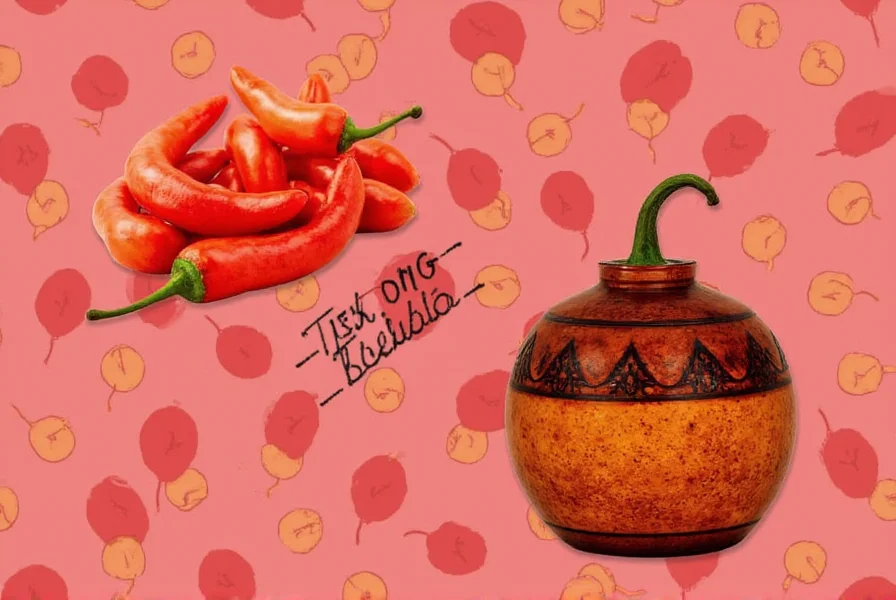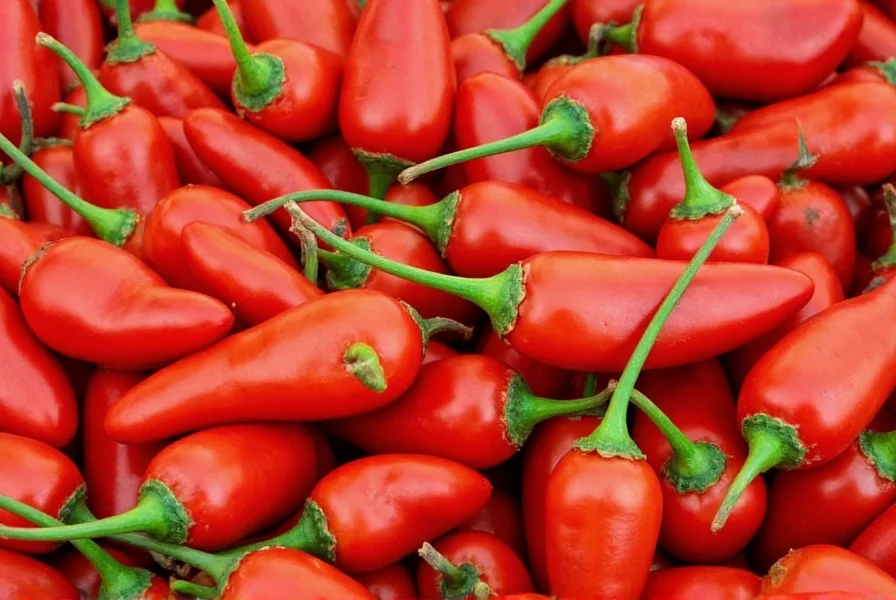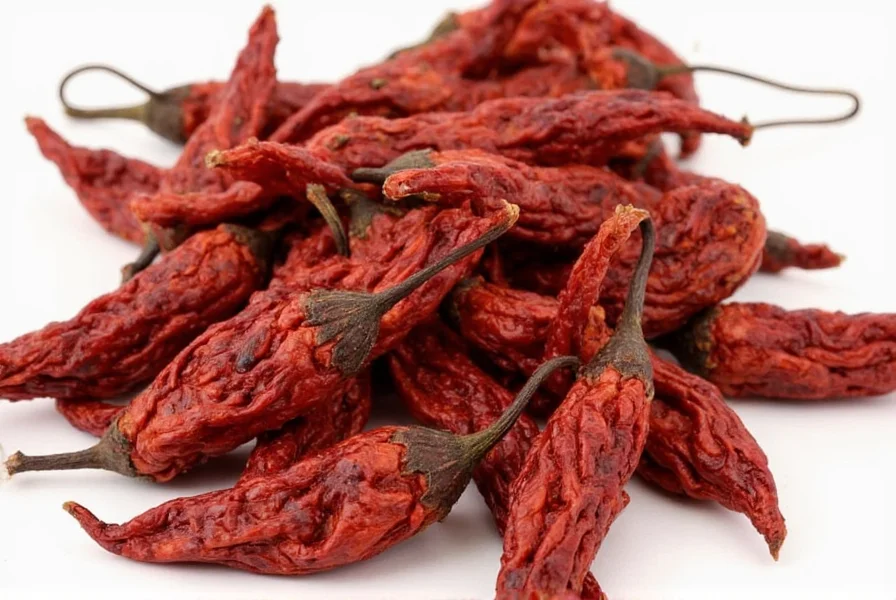Chile Bolita is a small, potent chili pepper with a Scoville heat range of 50,000 to 100,000 SHU, making it 10-20 times hotter than a jalapeño. This comprehensive guide covers everything you need to know about Chile Bolita, including its flavor profile, cooking uses, buying tips, storage advice, and safety precautions. Whether you're a spice enthusiast or a home cook, this resource provides actionable insights for using this versatile pepper.

What Is Chile Bolita?
The chile bolita, also known as the "little ball chili," is a small, round, orange-red chile native to Mexico. It gets its name from its distinctive spherical shape and intense heat. Though less famous than jalapeños or habaneros, it's gaining popularity among chefs and spice lovers for its balanced flavor and versatility in cooking.
Grown primarily in central and southern Mexico, the chile bolita (also called bolita chiltepin in some regions) is typically used dried but available fresh seasonally. Its compact size belies its potency, making it ideal for adding concentrated heat without overwhelming bulk in dishes.
How Hot Is It Really?
On the Scoville scale, which measures chile heat intensity, chile bolita ranges from 50,000 to 100,000 Scoville Heat Units (SHU). This places it significantly hotter than common peppers like jalapeños but below habaneros and ghost peppers.
| Chile | Heat Level (SHU) |
|---|---|
| Jalapeño | 2,500 – 8,000 |
| Serrano | 10,000 – 23,000 |
| Chile Bolita | 50,000 – 100,000 |
| Habanero | 100,000 – 350,000 |
Due to its small size, it's easy to underestimate how much heat it can deliver. A single pod can significantly impact a dish's spiciness, so use it cautiously when cooking.
Flavor Profile: More Than Just Heat
Beyond its fiery reputation, chile bolita offers complex flavor notes. When fresh, it has bright citrusy undertones that enhance salsas and sauces. When dried, it develops a deeper, smoky character similar to chipotle but with a sharper, more pronounced bite. This balance makes it a favorite for adding depth without dominating other ingredients.
How to Use Chile Bolita in Cooking
The versatility of chile bolita allows it to shine in multiple culinary applications:
- Grind it up: Toast and pulverize dried pods into powder for seasoning meats, soups, or cocktails.
- Add to sauces: Blend into mole, hot sauces, or creamy dips for subtle heat.
- Infuse oils: Steep pods in olive or chili oil to create a flavorful condiment.
- Use whole in stews: Add dried pods to simmering soups or braises for slow-released heat.
Buying Guide: Where & How to Buy Chile Bolita
Where to Buy
- Mexican grocery stores: Check dried spice aisles or refrigerated produce sections for fresh varieties.
- Online specialty retailers: Sites like Amazon, Spice House, or Mexican food specialists offer dried or fresh options.
- Farmers markets: Look for fresh chile bolita during late summer and early fall harvest seasons.
What to Look For
- Color: Bright red-orange indicates freshness; avoid dull or dark specimens.
- Texture: Fresh pods should be firm; dried pods should be brittle and crack easily.
- Smell: A strong, spicy aroma confirms potency and quality.
| Product Name | Features | Best For | Occasion |
|---|---|---|---|
| MexiSpice Organic Chile Bolita Pack | Organic, sun-dried, non-GMO | Homemade sauces and marinades | Weekend cooking projects |
| Tierra Roja Fresh Bolita Chiles | Fresh-picked, vacuum sealed | Raw salsas and garnishes | Taco nights and dinner parties |
| Bolita Crushed Chili Flakes | Powdered form, easy to sprinkle | Seasoning pizzas, pastas, and snacks | Quick weeknight meals |

Dried vs. Fresh: Which One Should You Choose?
Both forms have unique advantages depending on your cooking needs:
| Form | Pros | Cons |
|---|---|---|
| Fresh | Bright, citrusy flavor; ideal for raw applications | Short shelf life (up to 1 week); less available year-round |
| Dried | Long shelf life (up to 1 year); deeper, smokier flavor | Requires rehydration for some dishes |
Choose dried for infusing oils or slow-cooked dishes, and fresh for salsas or garnishes where vibrant flavor is key.
Storage Tips: Keep the Flavor Locked In
Proper storage preserves chile bolita's potency and flavor:
- Fresh chiles: Store in a breathable bag in the refrigerator for up to 7 days.
- Dried chiles: Keep in an airtight container away from light and moisture for up to 12 months.
- Ground chile: Store in a cool, dark place to maintain color and aroma.
Pro tip: Freeze extra fresh pods in a ziplock bag for future use—no thawing needed before cooking!

Safety First: Handling These Tiny Firecrackers
Due to its high capsaicin content, handle chile bolita with care:
- Wear food-safe gloves when cutting fresh pods.
- Avoid touching eyes or face after handling—capsaicin can cause severe irritation.
- If exposed to eyes, rinse immediately with milk or oil-based solutions (water is ineffective).
Comparing Chile Bolita to Other Chiles
Here's how chile bolita stacks up against popular peppers:
| Chile | Heat (SHU) | Flavor Notes | Best Use |
|---|---|---|---|
| Chile Bolita | 50,000–100,000 | Earthy, slightly fruity, sharp | Sauces, marinades, oils |
| Hatch Green | 2,500–10,000 | Grassy, roasted, variable | Enchiladas, burgers, stews |
| Habanero | 100,000–350,000 | Tropical fruit, floral | Hot sauces, Caribbean dishes |
| Thai Bird's Eye | 50,000–100,000 | Grassy, pungent | Curries, stir-fries |
Chile bolita shares heat levels with Thai bird's eye chiles but offers a more balanced, earthy flavor profile suitable for diverse cuisines.
Frequently Asked Questions About Chile Bolita
How hot is chile bolita compared to a jalapeño?
Chile bolita is 10-20 times hotter than jalapeños. While jalapeños range from 2,500-8,000 SHU, chile bolita measures 50,000-100,000 SHU, making it significantly more intense.
What does chile bolita taste like beyond the heat?
Beyond its intense heat, chile bolita offers bright citrusy notes when fresh and earthy, smoky undertones when dried. This complexity adds depth to sauces without overwhelming other flavors.
Where can I buy chile bolita if I don't live near a Mexican grocery store?
Online retailers like Amazon, Spice House, and specialty food sites sell dried or fresh chile bolita. For fresh versions, check local farmers markets during late summer and fall harvest seasons.
How should I use chile bolita if I'm new to spicy foods?
Start with minimal amounts—use 1/8 of a dried pod or equivalent powder. Add gradually while cooking, as heat intensifies with time. Dried and ground forms provide better control than whole fresh pods for beginners.
Are chile bolita and chiltepin the same thing?
Chile bolita is sometimes called "bolita chiltepin," but they differ. Chiltepin refers to wild varieties, while chile bolita typically denotes cultivated versions that are slightly larger and milder.
Can I grow chile bolita plants at home?
Yes, chile bolita plants thrive in containers with ample sunlight. They produce abundant small, round fruits but require pre-soaking seeds for germination. Ideal for warm climates or indoor growing with proper care.
What's the best substitute for chile bolita if I can't find it?
Thai bird's eye chilies (similar heat) or serrano peppers with a pinch of cayenne work well. For dried applications, blend guajillo chilies with cayenne to mimic the earthy flavor profile.
Why does my chile bolita taste different from what was described?
Heat and flavor vary based on growing conditions, soil, climate, and ripeness. Fresh versus dried preparation also dramatically changes the profile—dried versions develop smokier notes while fresh ones are brighter and citrusy.
Conclusion
Chile bolita delivers bold flavor and intense heat in a compact package, making it a versatile ingredient for any kitchen. With proper handling and creative use, this small chili can elevate sauces, marinades, and dishes with minimal effort. Start experimenting with small quantities to master its unique profile—your taste buds will thank you.










 浙公网安备
33010002000092号
浙公网安备
33010002000092号 浙B2-20120091-4
浙B2-20120091-4